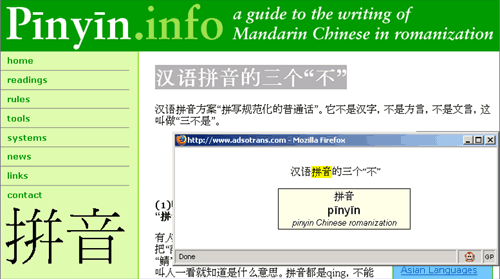Although my favorite Web browser remains Opera (which is now free), I recognize that Firefox (which has always been free) has some nice things going for it, especially its wide range of extensions.
At least two of these extensions might be of special interest to readers of this site: Translate, which will translate a Web page from Mandarin Chinese (as well as lots of other languages) into English (more or less), and the Adso GreaseMonkey Script, which provides Pinyin and English annotation for Chinese characters.
First, Translate, which is the cat’s pajamas. I don’t know how I survived without it.
- Using Firefox, Install Translate. (If that link has expired, find the installation through the home page of Gravelog.)
- Firefox will likely block your installation at first, which is a good thing. (Safety first.)
- Look for this message in a bar near the top of your browser window: “To protect your computer, Firefox prevented this site (ctomer.com) from installing software on your computer.”
- Click on the “Edit Options” button in the same bar (near the top right of your screen).
- A pop-up box will appear. Click on “Allow” and then “Close”.
Try out the extension by going to a Web page with text in Chinese characters.
From the Firefox menu, choose Tools --> Translate --> Translate from Chinese-simp[lified] (or Tools --> Translate --> Translate from Chinese-trad[itional], as appropriate). The translated Web page will appear in a few moments.
If you want to translate just a portion of the text on a Web page, or if Babel Fish chokes on the text of the entire Web page and you need an alternate approach, simply use your mouse to select the text you’re interested in. Next, right click and select Translate --> From Chinese-simp (or Translate --> From Chinese-trad , as appropriate). Note: The translation will appear in a new tab, so don’t sit around waiting for the translation to appear in the same tab you’ve been working in.
Translate also handles Japanese, Korean, French, German, Spanish, Italian, Dutch, Portuguese, Greek, and Russian.
A related but less effective extension is gtranslate, which handles limited amounts of text in simplified but not traditional characters.
Now let’s examine the Adso GreaseMonkey Script.
- Install Firefox or upgrade to version 1.5.
- Using Firefox, install Greasemonkey (If that link has expired, find the installation through the main Greasemonkey page.)
- Firefox will likely block your installation at first, which is a good thing. (Safety first.)
- Look for this message in a bar near the top of your browser window: “To protect your computer, Firefox prevented this site (greasemonkey.mozdev.org) from installing software on your computer.”
- Click on the “Edit Options” button in the same bar (near the top right of your screen).
- A pop-up box will appear. Click on “Allow” and then “Close”.
- Restart Firefox.
- Install the Adso GreaseMonkey Script.
- Look for this message in a bar near the top of your browser window: “This is a Greasemonkey user script. Click Install to start using it.”
- Click the “Install” button in the same bar (near the top right of your screen).
Try it out by going to a Web page with text in Chinese characters.
To activate the script, press “a”.
Click on or highlight the script you’re interested in seeing the Pinyin for.
Move your mouse over the Chinese characters in the pop-up box; the Pinyin will appear.

To deactivate the script, press any other key.
For more information, see the Firefox Plugin: Chinese text annotation thread on Chinese-forums.com.
Of related interest is the Rikai Web page converter.

Perhaps of more interest to advanced readers is the New Tong Wen Tang [sic.] Firefox extension, currently not available from Mozilla’s official extension site. It converts Simplified Chinese to the traditional script, and vice versa: http://rt.openfoundry.org/Foundry/Project/?Queue=333
Sounds great, thanks. I’m having a little trouble getting it installed, though.
Hmm…I’m not sure why. It seems to work fine at my end and has updated itself several times so far. I’m running Firefox 1.5 on XP.
“Tong Wen Tang” is exactly what I’m looking for. I can read Traditional chinese but have troubles reading Simplified. This extension rocks. if you have problem installing the extension, save the .xpi file to your desktop, then in Firefox, go to MenuBar -> File -> Open that file.
I just discovered this post. I must have been travelling when you wrote it was initially posted. Amazing stuff. Thanks!
ChinesePera-kun Firefox Extension
This is a popup Chinese dictionary modded from a version of Perapera-kun (which is modded from Rikai-chan), licensed under GNU GPL and uses the the dictionary file generously borrowed from Adsotrans.com
This is the Chinese version of Perapera-kun which will popup the pinyin reading and English definition when you mouse over Chinese in Simplified or Traditional characters.
get it here: https://addons.mozilla.org/firefox/3349/
I need a way to type pinyin phrases into a program that will give me
the english translation of phrases, not single words. Too time consuming
for a long document.
Is there scanner software that scans Chinese characters into word processor?
I get Chinese character documents, and Chinese Pinyin Documents, and to
translate them, has not been easy. (hard copy)
Any ideas?
thx in Adv,
mykl
I tweaked this script to work with Opera 9 – see here.
http://my.opera.com/community/forums/topic.dml?id=172836
This only works translating simplified and traditional encoded in UTF-8? I wanted to convert GB2312 to Big5, but the website didn’t convert. Should I use DimSum to do this?
Translate for Firefox has just been updated for Firefox 2.0*. It doesn’t yet have the same functionality as the older version, though — at least on my system and those of a few others.
After installing, right click on a toolbar. Select “Customize” and then drag the Translate icon onto a toolbar. Have fun.
Pingback: Freiheitsfreund
Pingback: Pinyin news » Opera’s translation widget